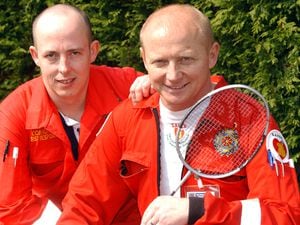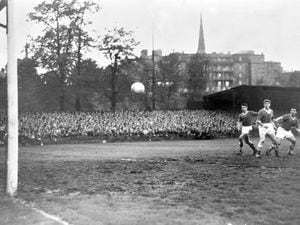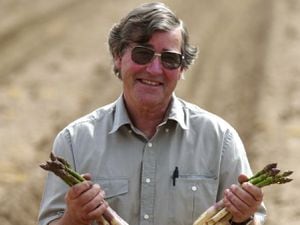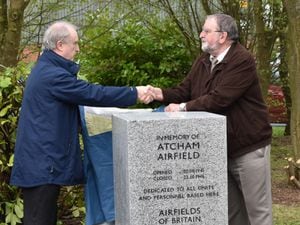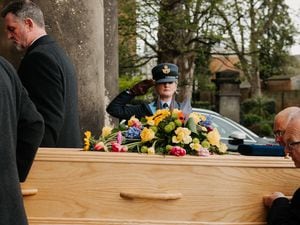Last orders for famous pub run
The Unicorn. Pear Tree Bridge. The Rose and Crown. With 11 pubs in 2.7 miles, the B5061 between Wellington and Oakengates used to be one fantastic pub crawl.
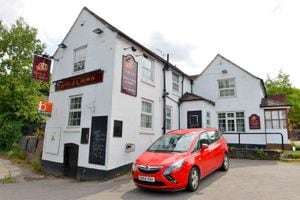
With The Greyhound at one end, and The Cock Hotel at the other, hundreds would flock to the varied and characterful pubs along the stretch.
Dave Ballinger recalls a vibrant pub scene when he first moved to Telford 30 years ago.
"The Unicorn was my first local, I was living in lodgings at the time, and I used to go in with my landlord and landlady," says the 52-year-old.
"It used to be a thriving place, they did some good food in there, the Cumberland sausages were excellent.
"The White Lion was another popular place, it was always quite busy on Saturdays at lunchtime and evening."
Three decades on, this short stretch of road is a microcosm of the changes which have taken place in the pub trade in Shropshire – or across the country for that matter – over the past decade.
Of the 11 pubs which lined the route three decades ago, just three are still trading. A fourth, The Hare & Hounds, has a sign outside promising it will be reopening soon, while a to-let sign sign hangs above The White Lion.
Many of these have been lost forever, though. The Greyhound, a the junction with the Eastern Primary route at Oakengates, was once such as well-known landmark that the traffic roundabout outside is known as 'Greyhound Island' to this day.
However the pub is long gone, although given its colourful reputation, there may well be some people in the area who were not entirely sad to see it go. Records suggest there may have been a pub on the site since the 18th century, and an 1896 inspection revealed that it had stabling for two horses, but was in need of some repairs.
It briefly made the news in 1910, when it held the inquest into a murder. Then in November 15, 1972, The Greyhound made the headlines again when a lorry smashed into the pub just before closing time. Amazingly, there were no serious injuries, although five people were taken to hospital. The pub suffered huge structural damage, and had to be virtually rebuilt, prompting landlord Alan Tonks to find some humour in the carnage.
"I was thinking of redecorating the place anyway," he quipped.
The pub reopened in June 1974, but it wasn't the end of its chequered history. In 1991 the rowdy behaviour and vandalism which had been afflicting the pub became so bad that the relief manager and his family fled in fear, refusing to return. The pub lasted a few more years, before closing in the mid-1990s.
The Hare & Hounds, which was known as The Omnibus until the 1990s, is closed at the moment, although a sign outside says it will be reopening soon. The pub has stood in Holyhead Road, between Oakengates and Ketley, for about 200 years. Harry Kumar, who is leasing the building from Punch Taverns, says the refurbished pub will open again on August 27, offering food to cater for a variety of tastes, ranging from traditional British grills to special Asian dishes.
No such optimism for the next two pubs along the stretch, though. The Pear Tree Bridge had been in what was then known as New Road since the 1700s, a time when the area was known for its apple and pear orchards. It took its name from the bridge that crossed the Ketley Canal that ran in front of the pub, slightly to the north of the line of the present Holyhead Road.
The pub called its final last orders some time around 2007, and remained empty for a while. It was finally converted into flats in 2011, despite objections from Oakengates Town Council. The old pub sign, altered slightly to say Pear Tree Bridge Apartments, is a nice nod to the building's past.
A bit further along, the Rose & Crown looks particularly forlorn. It was trading as a pub as recently as last year, but now lies empty following a troubled few years which saw it the scene of a violent assault in 2015. Planning permission has been granted to convert the main building into a four-bedroom house, and also to redevelop the car park, so it looks unlikely it will ever serve drinks again.
The Unicorn – where Dave Ballinger has fond memories of the home-brewed beer – is at least still a place where people can socialise, now being used as the Mauchak Indian restaurant, which opened in 2008.
Like most of the pubs along this stretch, much of its early history appears to have been lost in the mists of time, although it appears to have been in Ketley since at least the early 1800s. Records show that in 1876 it was described as "Unicorn Inn, butcher's shop, and small garden", and an 1896 inspection described it as having stabling for three horses and being in generally good condition, although some work was needed on the stables. At the time of the inspection, it had been kept by a Charles Galliers, who had been there for at least five years.
In 1992 it changed its name to The Pudding, after being taken over by the Little Pub Company, and kitted out as a Mad O'Rourke's theme pub with the customary glass-fibre cow's head outside, sawdust on the floor, and eccentric interior fixtures. It continued into this form until 2003, when it reverted back to its original name, but this was the beginning of the end for The Unicorn. which closed its doors in 2006.
According to the sign above the door, the White Lion has stood in Ketley since 1661, and in the late 1980s it was renowned for its food. But it has struggled in recent times, and finally closed this year, with a 'to let' sign hanging from the frontage.
Like Greyhound Island in Oakengates, the junction between the B5061 and Waterloo Road is still known as the Severn Stars, decades after the pub which stood at the crossroads was renamed.
Then again, the Severn Stars is reputed to have been at the junction since 1579, so it is perhaps not surprising that the name has stuck. Sadly, the old building, which was a famous coaching inn, was demolished in 1964 as part of a wider redevelopment at the junction, which also saw the construction of the high-rise flats and new Methodist church across the road.
In an attempt to create a trendy theme pub to capitalise on the yuppie era, the Stars was renamed Twenty's Video Bar in 1988 – supposedly because you had to be 20 or over to gain admission, although some recall this not always being the case. The venue was launched in a blaze of publicity – literally – when fire-eaters performed a dance on the roof for the opening ceremony, bringing along their pet snake Muscles to add a slither of extra drama. During this time it was festooned with about 30 large-screen television sets – well 23in, which was large at the time – which showed an endless loop of music videos, while jukeboxes pumped out the latest hits. This also coincided with a (slight) liberalisation of the licensing laws, which meant pubs could now open from 11am to 11pm, so owners could have a carvery dinner in the daytime and then watch a bit of Duran Duran in the evening.
It proved to be a short-lived fad, though, and by the early 90s the video bar concept seemed about as relevant as shoulder pads and red braces. After just four years the pub was given yet another revamp, when it became the Elephant & Castle. This was much more than just the usual refurbishment though, and the pub doubled in size to create a cocktail bar and restaurant. Like Twenty's before it, it attracted mainly the younger set, but after a few years it was struggling once more, and finally closed its doors in 2008 when it became the Blue Elephant restaurant. The faded Elephant & Castle sign at the front, now virtually illegible, is one of the few tell-tale symbols of the venue's colourful past.
Continuing towards the M54 island, we come to the first of the three pubs which have defied the odds and are still in business. The Horseshoes in Station Road is still very much the traditional community local, with nostalgic pictures looking at the area's past on the walls.
The Bucks Head, which lent its name to Telford United's football ground, closed sometime around 2006, and remained empty until 2010 when a Telford Christian Centre turned it into a youth centre. Since 2013, it has been occupied by Domino's pizza chain.
Also still trading is Christopher's Bar at the Swan Hotel in Wellington, although for how much longer remains to be seen.
Chris Witton, who has kept the Swan for the past 37 years, has sold the pub subject to contract, after gaining outline planning permission to knock it down and turn it into 20 flats. A previous plan to knock the pub down to make way for a Lidl supermarket, was rejected by councillors in 2004.
Mr Witton says the despite various initiatives including £3.95 carveries, special events and discount bed & breakfast offers, he has been unable to make the pub viable.
"People don't go into the pubs any more, they would rather sit at home with cheap beer," he says.
"It's terrible, we're losing all the community spirit that used to go with the pubs. I tried to sell it as a going concern in 2006, I had it valued by Christies at £925,000, I reduced the price by £400,000, and I couldn't even get £495,000."
Mr Witton does not know how long the Swan will remain open, but expects the new owner to seek full planning permission to demolish the building once the deal is complete.
"I've been here since 1981, and the amount of change since then is just incredible, people's drinking habits have changed," he said.
"It's not a surprise that most of them have closed. How can it be when you can go to Tesco and buy bottles of beer cheaper than I can buy it from the brewery and the cash and carry? It's impossible."
There has been a pub on the site since the 15th century, but the original timber-framed coaching inn was demolished in 1960 after its structure was damaged by death watch beetles. The present Swan Hotel, which took design cues from the original, was built shortly after.
Finally, at the end of the trail, we come to the 250-year-old Cock Hotel, which proves that it is still possible to succeed in the pub trade today, despite the obvious difficulties. Helped, no doubt by its prominent location, the Cock has won countless awards over the years, including Telford and East Shropshire Camra's Best Town Pub of the Year in 2014. Landlord Peter Arden, who has kept the pub with his wife Liz for about 20 years, is due to retire at the end of the month, but says he is confident the new owners will keep the tradition going.
Peter says crucial to the pub's success is that it has kept its unique character, without falling into the trap of loud music and televised sports.
"We keep eight beers on, that's what we're all about," he says.
"We don't do food, there's no TVs or fruit machines, people just come in to drink the beer and have fun."
Dave Ballinger points out that the road used to form part of the A5, and that much of the passing trade would have been lost when the roads were re-routed.
But Eddie Main, a former chairman of the Licensed Victuallers' Association, warned as long ago as 2009 that the traditional British pub was becoming an endangered species.
"We are in the death throes of the English pub," he said.
"The good old days have gone, in 10 or 20 years' time youngsters will be asking their dads, 'Dad, what was a pub?'"
That was nine years ago. We have another 11 years to see whether that will prove correct.

